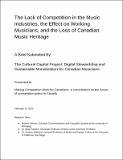| dc.contributor.author | Selman, Brianne | |
| dc.contributor.author | Fauteux, Brian | |
| dc.contributor.author | deWaard, Andrew | |
| dc.date.accessioned | 2023-03-02T21:20:25Z | |
| dc.date.available | 2023-03-02T21:20:25Z | |
| dc.date.issued | 2023-03-02 | |
| dc.identifier.uri | https://hdl.handle.net/10680/2042 | |
| dc.description | A Brief Submitted By: The Cultural Capital Project: Digital Stewardship and Sustainable Monetization for Canadian Musicians
Presented to: Making Competition Work for Canadians: A consultation on the future of competition policy in Canada | en_US |
| dc.description.abstract | It is our contention that the music industries in Canada exhibit an oligopoly structure, formed of a handful of non-competitive, non-Canadian firms, which gravely harms both the livelihoods of Canadian musicians and the long term sustainability of Canadian music. Our research concludes the problem is not a consequence of anything unique to music as a cultural product, but partially a function of how competition is regulated in this country, or, more accurately, not regulated. Along with more rigorous enforcement of competition, we recommend that the Competition Act be updated to center the concerns of workers and consumers, which would have ripple effects on the health of many sectors in Canada, including music. | en_US |
| dc.description.sponsorship | Research contributing to this brief was conducted with a SSHRC grant | en_US |
| dc.language.iso | en | en_US |
| dc.rights | info:eu-repo/semantics/openAccess | en_US |
| dc.subject | Research Subject Categories::LAW/JURISPRUDENCE::Other law::Competition law | en_US |
| dc.subject | competition | en_US |
| dc.subject | anti-trust | en_US |
| dc.subject | music industry | en_US |
| dc.title | The Lack of Competition in the Music Industries, the Effect on Working Musicians, and the Loss of Canadian Music Heritage | en_US |
| dc.type | Working Paper | en_US |
| dc.rights.license | CC-BY-NC.4.0 | en_US |

